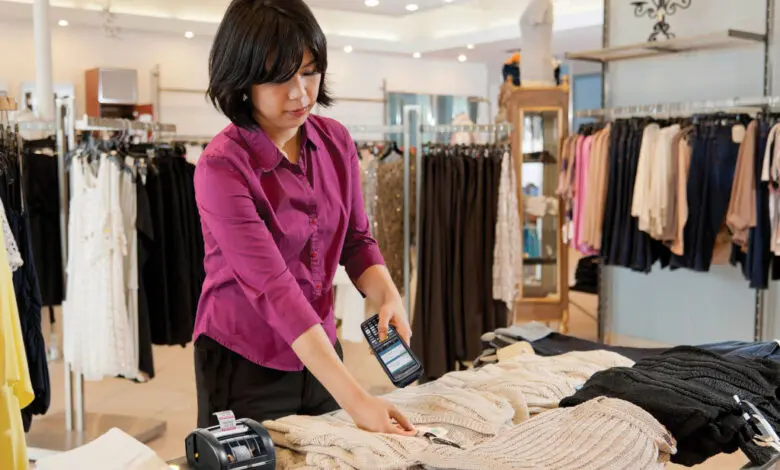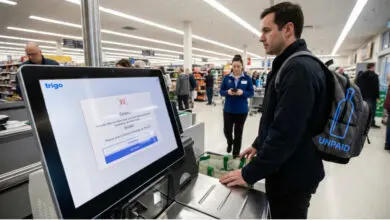From hype to store: AI arrives in retail

AI technologies are rapidly gaining importance in the retail industry. There is a wide range of possible applications for retail companies, from internal processes to logistics and personnel. While generative AI is expected to have great potential on the one hand, the possible applications for brick-and-mortar retailers are still unclear. However, companies in the retail sector are achieving efficiency gains, as demonstrated by practical examples of artificial intelligence at the checkout at Netto, at Rewe Group and in store layout planning at Rossmann. In addition, the use of AI in sales support and task management at M-Preis demonstrates how the technology makes employees’ work easier. AI also provides tips on learning content in training, helping to overcome the obstacles posed by the shortage of skilled labour. Using AI in a diverse and meaningful way is an opportunity for the future of retail, which is why 70 per cent of retailers have started to invest.
Artificial intelligence is said to have enormous potential and generative AI is even said to have a revolutionary effect on the retail sector: AI is expected to speed up processes and increase productivity, sales and earnings. AI applications can be found in all key business areas, from stores, logistics and purchasing to staff and customers. These and other areas are to be transformed through the use of AI in retail.
But what is the real state of retail? Has AI already arrived in the stores? And what are German retailers doing to promote the adoption of AI in their stores?
German retail sector is increasingly focussing on AI
The introduction of AI technologies is rapidly gaining importance worldwide and also in Germany: according to the latest study by EHI Retail Institute ‘Generative AI in retail’, 70 per cent of retail companies have already invested in AI applications or are planning to do so in the next twelve months.
Of those surveyed, 23.3 per cent are hoping for support in logistics, merchandise planning and supply chain management in particular. Around a quarter use AI in marketing, purchasing and category management. Other areas of application include chatbots and applications designed to increase employee productivity and support content creation.

Disruption and drivers in the retail sector
While the retail sector has been able to continuously increase sales in recent years and will have a turnover of around 649.9 billion Euros in 2023, according to Statista, the retail industry is also undergoing change. The drivers are the high level of market concentration, in which non-chain retailers are being pushed out of the market by large central managed organisations and the increasing market pressure from growing e-commerce. The share of sales generated by online retail has risen continuously in recent years and most recently stood at around seven per cent.
In addition, the shift to omnichannel retail has led to a digital disruption that has fundamentally changed the customer journey. New customer touchpoints and new business models have emerged. At the same time, consumer expectations have become more demanding. The trend is towards personalised experiences, fast delivery and high product quality. Sustainability also plays a role because customers are looking for environmentally friendly products and are paying attention to sustainable supply chains, packaging and energy-efficient practices.
Innovation as a competitive factor
In addition, global competition presents companies with enormous challenges. Globalisation has made race tougher and faster. Companies need to be innovative in order to remain competitive.
Data is gold – and the retail industry generates huge amounts of data, from sales transactions to customer feedback. The opportunities for data-driven decisions are excellent, but the sheer flood of data needs to be channelled. Ultimately, the problem lies not in collecting data, but in the ability to consolidate, analyse and control the available data. This is confirmed by 94 per cent of managers in the latest Salesforce ‘State of Data and Analytics’ survey, who say that their organisation should get more value from its data.
Generative AI increases productivity
A recent survey conducted by IW Consult on behalf of Google predicts great potential for generative AI in the German retail sector. According to the survey, the use of AI-based tools could enable annual growth in retail productivity of up to 1.3 per cent. It is estimated that the use of generative AI could increase gross value added in the German retail sector by 10 billion euros.
Expectations are particularly high for generative AI. But how does generative AI differ from other forms of AI? “One of the most important differences is the scale of this new technology,” says Maximilian J. Schäfer, Senior Account Manager DACH Retail Software at Zebra Technologies. “Generative AI is not just limited to one context, such as software development or workforce scheduling. Almost everything that happens in retail today harbours potential for the use of AI. As a customer, I take a photo of the contents of my fridge and the AI tells me what I can cook and automatically orders for me from the supermarket of my choice, where I can then pick up the food or have it delivered. The pace of this technological change is happening at breakneck speed.”
Brick-and-mortar retail finds application difficult
Although these visions of the future sound promising, brick-and-mortar retailers are still finding it difficult to define specific AI applications. In fact, respondents in brick-and-mortar retail are unsure and do not see any suitable areas of application: According to the study conducted by IW Consult on behalf of Google, 36 per cent of managers surveyed in brick-and-mortar retail and 26 per cent of those in online retail do not know where they should start with the use of AI. And 43 per cent of managers in bricks-and-mortar retail and 34 per cent in online retail say that they do not see how the use of AI can currently create added value for them.
Generative and Predictive AI
To identify areas of application for AI, it helps to look at the sub-areas of the technology:
Generative AI refers to technologies that are able to create new data based on patterns and information learned from existing data. In other words, generative AI is a branch of artificial intelligence that enables computers to create original content, from images and artwork to poetry, music, text, video, dialogue and even computer code. Generative AI is therefore an extremely important technological change with far-reaching implications.
Predictive AI models are designed to speed up decision-making with data that is as accurate and well-founded as possible. They analyse patterns and make predictions by identifying data anomalies and calculating future events. This can reduce the time companies need to research or analyse information, leaving more time for strategic decision-making.
Both generative and predictive AI are underpinned by machine learning. Machine learning is a subfield of AI that focuses on developing algorithms and techniques that learn from data. It is often used for classification and regression problems.
Deep learning is a special type of machine learning based on neural networks with multiple layers that can learn abstract hierarchies of features. Typical tasks include image and speech recognition, which require large amounts of data and computing power.
Top trend generative AI
According to technology research and consulting firm Gartner, generative AI is one of the top tech trends in numerous sectors, including retail in particular. Since the launch of ChatGPT, the chatbot from US company Open AI, in November 2022, the use and acceptance of AI technologies has increased rapidly in almost all industries.
The German market for generative AI is estimated to be worth almost 30 billion Euros in 2030 – more than six times the size it was ten years ago.
The use of AI promises a quantum leap in the automation of processes, in the acceleration and improvement of decision-making and in product development, as products and services can be developed in a more customised way. It is also expected to increase innovative strength.
AI will play a decisive role in the future
The majority of respondents in the EHI survey ‘Generative AI in retail’ believe that artificial intelligence (AI) will play a decisive role in the future and will influence many areas of our daily lives. Most expect AI to simplify our lives by helping us with various daily tasks. 63 per cent of those surveyed by EHI are convinced that generative AI offers exciting application opportunities for retailers and will influence the entire value chain.
When asked about their business objectives, the majority of respondents agreed with statements focussing on savings. 62.2 per cent see savings in internal processes and 42 per cent in personnel. On the other hand, 31.7 per cent expect an increase in turnover and 39.6 per cent expect an increase in earnings when using AI.
AI helps to automate processes
AI offers valuable support in many business processes – in the store at self-checkout, for example, or in customer contact with mobile sales advisors. Also in marketing keyword personalisation. Other areas include price optimisation, product range planning and logistics with the optimisation of supply chains, inventory management, demand forecasting and route planning.
In purchasing, AI is useful for the automation of ordering processes, price negotiations and supplier selection. Last but not least, AI is used in human resources for automated recruitment, employee development and performance evaluation for workforce planning and training.
AI is revolutionising the checkout
POS solutions in retail have long been more than simple PC cash registers. Now self-service is on the rise. To reduce waiting times and speed up the checkout process, more and more companies are turning to flexible, hybrid kiosk terminals and smart checkout stations. According to the study of EHI Retail Institute, around 16,000 self-service checkouts are currently in use in more than 5000 stores in Germany. Most of these are located in supermarkets such as Rewe and Edeka.
AI makes self-checkouts more efficient because it solves key checkout problems. Smart technologies reduce friction points such as scanning products or purchasing age-restricted items. AI is used in various forms: voice assistants facilitate the checkout process, while deep learning trains systems to recognise products and minimise errors. Computer vision recognises which items are in the shopping basket or on the checkout conveyor belt – for a smooth and fast checkout.
Camera technology at the checkout – computer vision
In the future, checkouts with computer vision cameras should work at high speed and make scanning redundant. US technology company Radius-AI, for example, is working on solutions where shoppers place their items on the counter and cameras capture all the products in less than a second. Product details and total costs appear on the screen. Customers can complete the purchase themselves, while the system automatically notifies the cashier in the case of vouchers or items with age restrictions, according to Radius-AI’s vision.

Practical examples of AI in Retail from the German speaking area
From hype to game changer? Does this also apply to AI in retail? Where is AI actually being used at shop level in German companies in the sector today? The following practical examples from selected sales outlets in the German speaking countries show this.Artificial intelligence as a shopping companion at Netto
In its 800 square metre Regensburg store, Netto enables autonomous shopping with cashless payment methods without prior registration and without the need to use a smartphone. After entering the shop, smart technology in the ceilings and shelves allocates the products taken from the shelves to each customer, creating the individual shopping baskets and purchase amounts in real time. This is done anonymously, without any personal data being recorded. The special feature: In contrast to the previous Pick&Go concepts, the respectively calculated shopping basket is not displayed afterwards, but before payment at the fast exit terminal. Customers receive their receipt directly at the terminal in the store.Image processing during scanning
Zebra recently introduced a hardware solution for self-checkout that is equipped with AI functionalities. Zebra’s MP72 Series multi-level scanner uses image processing-based software and an enhanced colour camera that recognises items as they are scanned. With the advanced scanner, customers need less help because they don’t have to guess items. At the same time, the device reduces the risk of fraud and shrinkage.Automated checkout solutions at Rewe
The Rewe Group also relies on modern, AI-supported checkout solutions in some stores. Customers can choose how they want to pay for their purchases: Cashierless via app, by scanning and paying at the self-checkout terminal, via computer vision support without scanning at the self-checkout terminal or in the traditional way at the conveyor belt checkout. Purchases are recorded in the store using state-of-the-art camera and sensor technology and, if desired, automatically settled after leaving the store without a checkout process. Rewe is working with Trigo on this project, whose solution creates a 3D model of a supermarket to digitally map the environment and movements within it, allowing customers to select items and walk out with them while protecting their privacy.Generative AI for store planning at Rossmann
Another example of applications in which retailers use generative AI for self-checkout is the model used by drugstore chain Rossmann: every time Rossmann opens a new store or reopens after a refurbishment, the question arises as to the optimum number of self-checkouts. In order to provide a reliable basis for decision-making, Rossmann has developed an AI model based on machine learning that accurately determines the ideal number of self-checkout tills for each individual store based on various influencing factors.How AI supports sales staff
AI is increasingly being used to increase boost both the productivity and job satisfaction of sales staff. It supports employees on the shop floor by recommending actions based on standardised processes and conclusions drawn from customer behaviour. With solutions that are used on the shop floor, employees and managers can access applications via mobile devices such as smartphones, tablets or PCs and receive answers to questions efficiently and quickly using natural language. Questions range from products, product catalogues, sales issues to personnel guidelines and training.
Task management at Bonita and M-Preis
One way to increase productivity in the store, for example, is to use AI-supported task management technology. This makes it easier for employees to keep track of their work and systematically get things done by automatically prioritising tasks on their mobile device. With the Zebra Workcloud Task Management solution, which is used at Bonita and the convenience stores at BP’s Aral, for example, store employees are assigned and prioritised work orders by role, which leads to a higher implementation rate.
Austrian retail company M-Preis introduced Zebra’s solution last year. Thanks to the new task management system, the Austrian retailer has reduced tasks by more than 60 per cent compared to before the roll-out. To this end, a clear communication process was introduced in the company, in which the number of communication channels, which previously ranged from WhatsApp to email and fax, were brought together in the ‘MyWork’ platform. Zebra’s project team also helped the retail company to structure tasks more clearly from the outset and to formulate them better and more clearly before assigning them to employees. Work assignments are now also scrutinised more closely in order to avoid overloading the stores with activities. With task management, 9 out of 10 tasks are now completed on time.
Sales support with mobile devices
AI in the store also supports employees in advising customers: with the help of AI-supported mobile devices, sales staff can quickly access product overviews and information without having to search through physical catalogues. AI enables personalised product recommendations based on customer preferences or current sales data.
One application is the Ikea app, which customers can use to research or have employees in the stores assist them with planning using mobile devices.
In future, the app will offer personalised content in addition to catalogue functions and navigate customers through the store with a new navigation mode that uses augmented reality to guide them to their desired product. Cross-channel functions such as shopping lists, Shop & Go for product scanning and payment at the checkout as well as an integrated 3D room planner are already available.
Chatbots as little helpers in brick-and-mortar retail
Chatbots are another helper in brick-and-mortar retail. They help companies provide customers with information and save staff time. They also contribute to digital transformation because they collect data and store it in a form that can be analysed.
While chatbots are already widespread in online retail, with retailers such as MediaMarkt and Otto using them, in-store applications are still less common.
One example from the retail sector is Ikea Germany with a chatbot that supports customers on the website and in the app and provides information on products, deliveries, returns and store locations. The bot also helps customers plan furniture purchases and makes recommendations based on their needs.
Drugstore operator dm developed its own chatbot this year, which is already being tested internally. According to dm, ‘dmGPT is our company’s own instance of the GPT-3.5 language model’. The software was developed internally in dm’s IT department, where around 1,100 employees have already trialled dmGPT. The programme can be tested by the entire workforce. Later, all dm staff will also be able to use it in the stores and logistics.
Artificial intelligence in inventory and stock management
AI in inventory management is used to optimise stock levels, forecast demand and improve supply chain efficiency through data analysis and predictive algorithms. AI helps to make inventory more efficient by automatically updating stock levels and providing sales forecasts, as AI offers great opportunities in the entire field of efficiency when it comes to optimising supply chains, inventory management, administration and logistics. For example, it supports the optimisation of warehousing, the generation of leads or the customised design of an ERP dashboard for users and process automation.
For example, when an order is received in a web shop, the AI system automatically checks the order status and the availability of the required material in the warehouse. If so, the order is sent to production. If not, the system determines whether the material can be replenished in time, and if so, the system places the order and sends the order confirmation to the customer. The whole process is handled by AI. Humans only need to intervene when problems arise.

AI in inventory management at Schwarz Group
Schwarz Group, with its Lidl and Kaufland, has recently started using artificial intelligence in inventory management. Christian Müller, Co-CEO of the company’s new digital division, announced this on the occasion of the acquisition of the German start-up Aleph Alpha in November 2023. AI in logistics will help to manage inventories and anticipate factors such as regional holidays or major events and incorporate them into demand forecasts.
AI could also, for example, take over the product description of items that are offered online. “There have already been promising trials in this area, which have shown that AI has done a very good job,” says Christian Müller. However, we are “only at the beginning of a long journey”.
In-store logistics with AI at Rewe and dm
The drugstore operator dm and Rewe Group implemented another approach using AI technology in their supermarkets as early as 2022 with the use of an inventory robot. This robot drives autonomously through the store after closing time, scans shelves and furniture and creates a digital 3D image of the store.
At dm, the focus is on creating realograms, in other words: digital twins. These are intended to optimise day-to-day business by scanning shelves and products. On this basis, robots can then pack individually calculated pallets for each individual store and thus improve in-store logistics. The data collected can then be evaluated using artificial intelligence in order to improve shelf stocking, optimise warehousing or, for example, carry out a complete inventory.
Hornbach relies on computer vision
DIY store operator Hornbach is digitising the purchase of loose goods in its stores. Instead of having customers fill out slips of paper as before, a special camera on the shelf automatically recognises the desired items. Together with technology supplier Captana, a subsidiary of VusionGroup, Hornbach sees potential in computer vision technology for other product ranges.
Assistance functions at Deichmann
Shoe retailer Deichmann is also discussing AI as part of the introduction of a new merchandise management system. In this context, the IT Wholesale department at Deichmann is also looking at artificial intelligence for digital and efficient support of automated processes.
“Microsoft 365 Copilot will be used to determine whether and how AI can be used in wholesale in the future to support everyday activities. For example, for tasks such as order entry and article master data maintenance. This is a very exciting field that will also have a major impact on the way we work in an ERP context,” explains Richard Muth, Head of IT Wholesale at Deichmann.

Price optimisation with AI
Price plays a decisive role in the success of a company. However, it requires enormous effort to constantly adapt a large number of prices to market changes and company goals. This is where artificial intelligence can help by automating and accelerating the process to optimise prices efficiently and accurately.
AI-based pricing tools use machine learning and big data to analyse factors such as demand patterns, market conditions and competitive strategies in real time. This allows them to predict precise price adjustments that would not be possible manually. Through continuous learning, they optimise their recommendations and increase the profitability of companies in the long term. The tools are already being used by many retailers, such as the pricing software from Revionics at electronics retailer Conrad Electronic and household appliance company WMF.
Automatic pricing in specialist retail
One company that uses pricing software is the purchasing cooperative Euronics. It uses a SaaS solution from the German provider Xpln to automatically submit optimised price suggestions to the approximately 1,200 affiliated electronics retailers in Germany. The system ensures that retailers do not offer prices that are either too high or too low.
The Popken Fashion Group also uses a tool from GK Software to optimise prices in its 23 online stores and 250 stores. Tests have shown that price increases for certain items can have a positive impact on gross profit. “From the fourth to fifth day onwards, our tests have shown that GK Air works much better and the net gross profit could be increased by 0.82 Euros per item,” says Marlon Stresow, Head of Business Intelligence at Popken Fashion Group.
Workforce scheduling and training
In the area of workforce scheduling, AI-based solutions provide support for HR managers. They automatically create plans that avoid overstaffing and understaffing, assign employees to the right shifts based on their respective skills and take into account the frequency in the store. As the AI works in real time, it can also suggest more flexible measures in the event of bottlenecks.
One solution that creates staff scheduling and budgets based on customer demand and workload to streamline operations and engage the new generation of employees is Zebra’s Workcloud Scheduling. The software uses powerful AI and analytics to improve the entire scheduling process. The system optimises forecasting, planning and shift management to increase employee retention and improve the bottom line.
Retailers such as the American fashion company Vera Bradley use Zebra Work cloud Scheduling to allocate staff according to customer demand and have achieved an improvement in planning efficiency of 25 to 50 per cent. Each store saves 15 hours per week of staff time that can be used for sales. The system also enables an annual saving of 6 per cent in labour costs.
AI analyses also help to detect shrinkage and evaluate inventory data. With the Zebra Workcloud Inventory Optimization suite, retailers can perform accurate, high-quality inventory counts and use AI analytics to detect sales and stock anomalies in a timely manner. By reducing perishable inventory time by three hours per store, a major US supermarket chain saves 2.9 million US-Dollar annually.

AI suggests learning content
AI also supports training courses with personalised training programs and guidelines. Employees can access these via mobile devices that are supported by AI algorithms. These systems offer recommendations for further training based on employees’ performance and interests.
One example of this is L’Oreal’s My Learning platform. Sales employees can access training materials, courses and guidelines via mobile devices, with AI-based recommendations for further learning content being suggested.
Most are still hesitant about using AI
The examples from the retail sector show that the industry is pursuing AI with positive enthusiasm. According to a Bitkom study from October 2023, 56 per cent of retailers see the use of AI as crucial to their competitiveness. The current EHI study illustrates the current attitude towards generative AI: two thirds rate its importance as rather low, while one third consider it important or very important. The trend is pointing upwards, as a significant increase in these figures is expected over the next two years.
Today, 70 per cent of companies are already investing in AI applications, while according to the Bitkom study in 2023, 77 per cent of retailers still stated that AI was not an issue for them. This discrepancy can be explained by the heterogeneous structure of the retail sector: larger companies are investing earlier, while smaller ones are taking a wait-and-see approach. For example, 73 per cent of retailers stated that they were waiting to see what others had experienced with new AI technologies. An important bottleneck factor here is personnel: 61 per cent of companies lack the qualified employees to drive the use of AI forward.
Security is a major hurdle
Despite all the euphoria about the possibilities of AI in retail, there are also concerns. Three quarters of retailers fear that the use of AI in customer service could increase the distance to customers, and 72 per cent are concerned about possible damage caused by AI-generated fake reviews. A majority of 54 per cent cite security concerns as the biggest hurdle. A further 51 per cent are concerned about legal uncertainties and 50 per cent criticise the lack of reliability.
In addition, there is often a lack of skilled workers: only 12 per cent of companies have sufficiently qualified staff, while 58 per cent have only partially qualified or no qualified staff at all. Data protection, EU regulations and outdated processes make the path even more difficult.
Better to get started than to wait and see
So there is still a lot to do before AI reaches the retail sector across the board: Two thirds of companies (68 per cent) consider themselves to be laggards in terms of digitalisation, and three per cent feel that they have already lost touch. Only 23 per cent see themselves as pioneers, while just four per cent claim to be at the forefront. The road to full integration of AI technologies therefore still seems to be a long one.
Bitkom CEO Dr. Bernhard Rohleder wants to encourage companies to innovate and says: “Wait and see is rarely a good strategy. The barriers to entry for the use of AI are currently lower than ever before. From customer service to advertising campaigns, from purchasing planning to product launches – AI can be used effectively almost everywhere in retail.”




